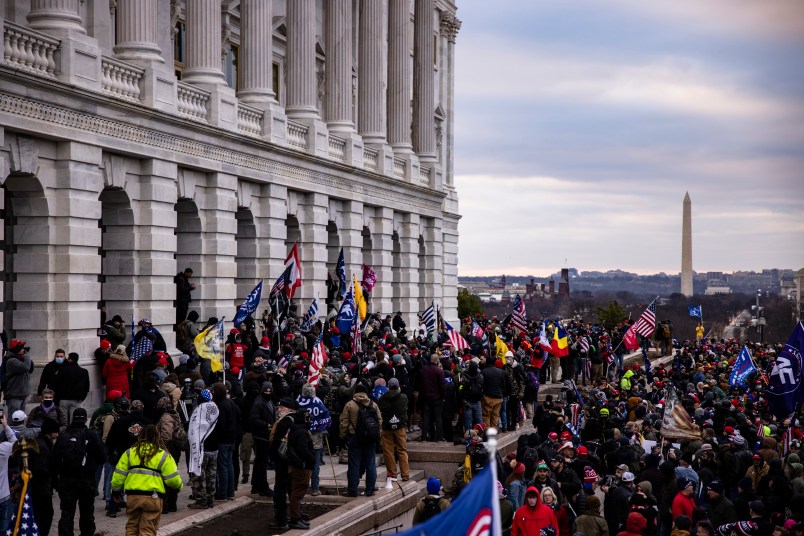The Supreme Court on Friday narrowed an obstruction charge that had been used in the prosecution of hundreds of Jan. 6 insurrectionists — and in the pending case against Donald Trump — with an unusual configuration of justices.
Chief Justice John Roberts wrote for the majority and Justice Amy Coney Barrett for the dissenters. In a twist, liberal Justice Ketanji Brown Jackson joined the rest of the conservatives in the majority, while Barrett was cabined with Justices Elena Kagan and Sonia Sotomayor.
The case rested on a myopic, close reading of a statute used against Joseph Fischer, who allegedly breached the Capitol on Jan. 6. It reads: “(c) Whoever corruptly— (1) alters, destroys, mutilates, or conceals a record, document, or other object, or attempts to do so, with the intent to impair the object’s integrity or availability for use in an official proceeding; or (2) otherwise obstructs, influences, or impedes any official proceeding, or attempts to do so, shall be fined…or imprisoned not more than 20 years, or both.”
The case hinges on the “otherwise obstructs” clause. The government argued that that section sweeps broadly enough to nab Fischer for attempting to prevent Congress’ certification of the Electoral College votes. The majority on Friday read the statute much more narrowly, ruling that it only applies to similar evidence destruction as described in the first clause.
Jackson’s joining with odd bedfellows in this case may speak to her background as a public defender and her inclination to read statutes used against criminal defendants narrowly.
“Here, it beggars belief that Congress would have inserted a breathtakingly broad, first-of-its-kind criminal obstruction statute (accompanied by a substantial 20-year maximum penalty) in the midst of a significantly more granular series of obstruction prohibitions without clarifying its intent to do so — not in the text of the provision itself, nor in the surrounding statutory context, nor in any statement issued during the enactment process,” she wrote.
She added, though, that the certification of the Electoral College votes certainly involved records and documents, including the votes themselves. If Fischer attempted to impair those, she wrote, his conduct may still fall under this law even within the confined reading. Notably, this is similar to the argument Special Counsel Jack Smith made in his Trump case when the Fischer one was coming down the pike; even under a narrow reading of the obstruction statute, Trump’s slates of fake electors put him squarely within this law’s reach, he argued.
Barrett comes down differently. Yes, the second section of the statute is sweeping, and Congress likely didn’t imagine this use of it when it was legislating in the wake of the Enron scandal (“who could blame Congress for that failure of imagination?” she quipped). But that’s how it is, she argued, and the Court doesn’t get to retroactively change legislative intent just because the breadth of a statute makes it squeamish.
“There is no getting around it: Section 1512(c)(2) is an expansive statute,” she wrote. “Yet Congress, not this Court, weighs the ‘pros and cons of whether a statute should sweep broadly or narrowly.’”
The Court sent Fischer’s case back down for the lower courts to reexamine with this new understanding of the statute.
How exactly it’ll intersect with the Trump case is yet to be seen; with one last decision day of the term, the Court has yet to release its ruling on the extent that Trump can claim presidential immunity to duck Smith’s case.
Read the ruling here:







Head spinning!! Ketanji Jackson Brown in the majority and Amy Coney Barrett amongst the dissenters??
It seems we’re up to the “dogs and cats sleeping together. Mass Hysteria!” portion of the end times.
Just wait until the majority finds Monday that Trump is immune from prosecution. Law and order will be turned on its head.
Libertine men and scarlet women, and ragtime, shameless music
That’ll grab your son, your daughter with the arms of a jungle, animal instinct
Mass-staria!
Have any of the Ladies on the court, sans the Handmaiden, written a majority opinion this term?